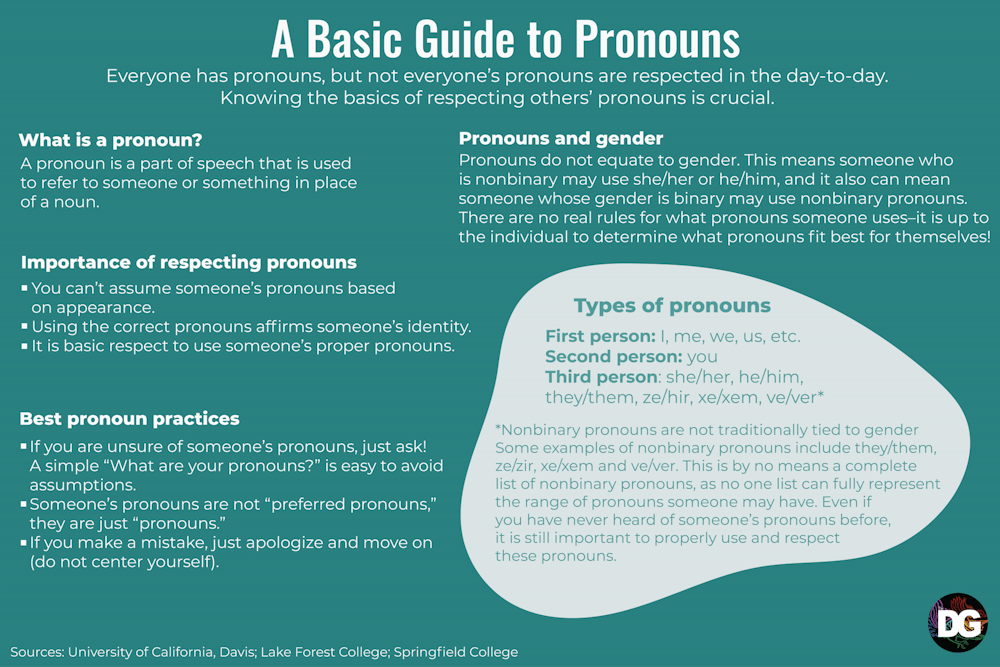USC faculty and students began earnestly discussing a project to create guidelines around pronouns in the classroom a couple of years ago. USC does not have an official pronoun policy, which leaves professors and students to make up their own guidelines.
Julian Williams, the VP of Diversity, Equity and Inclusion, is drafting a pronoun policy with his office that sets expectations for the USC community but will not mandate that faculty and staff members must use a student's preferred name and pronouns.
Williams is working with the registrar, HR and IT to set up systems within Microsoft Office 360, Banner and CarolinaCard so faculty, students and staff can add their preferred names and pronouns to each program.
"We will provide guidance and education to community members as to why we think it's important that they do so," Williams said. "But we can't mandate that a faculty member utilize that information. From my perspective, I think most of our faculty and staff members will do so."
Atticus Wolfe, an instructor in the sociology department and doctoral student, hasn't faced discrimination at USC for encouraging the use of pronouns. However, he knows other graduate and undergraduate students who have been victims of discrimination.
"(Some) individuals have already shared their pronouns and then come to find out that people are talking about them behind their back, saying that they are doing things for attention, trying to ascertain very transphobic and also sexist ideologies," Wolfe, who is trans, said.
As an instructor, Wolfe interacts with preferred pronouns among students and professors. He often encourages students to mirror him when he includes his pronouns in his introductions. Most interactions with instructors are positive, but Wolfe has recognized some discomfort when encouraging other instructors to use pronouns.
"That's where I see the discrepancy," Wolfe said, "You know, in the classroom, if you're a student, there's a huge power differential in you and your instructor. So it's very much going to depend on how much do you feel it's comfortable to take actions and matters into your own hands, because the vast majority of (professors) do not share their pronouns."
The Office of Diversity, Equity and Inclusion is also launching a website for the guidelines and will set expectations for community members for pronoun usage and how the DEI office will implement these guidelines.
Williams does not have a set time period for when the policy will be officially implemented.
Gianna Modicamore, the co-founder of Pride and Professionalism, a club focused on creating a network of professionally focused LGBTQIA+ individuals, and a 2022 USC graduate, compared the frequency of using pronouns in student life and in the classroom. She said she believed students are generally good at respecting others' pronouns. However, most professors didn't use pronouns in her classes and never asked for students.
"I definitely did notice a difference in my classes," Modicamore said. "I was a business major, so I don't think I had one professor in the business school that asked us for our pronouns. So that was definitely kind of disappointing."
As of now, students, faculty and staff can include their pronouns in my.sc.edu's identity management system. On Sept. 7, USC IT Department announced that students and faculty would also be able to put pronouns in Blackboard.
Modicamore believes using pronouns in a classroom setting should be mandated, describing it as a "common courtesy."
"I think it just expresses inclusion and expresses respect for people that you're dealing with," Modicamore said.

Meanwhile, Wolfe acknowledges USC's inclusivity progress but doesn't believe USC has followed through with the protection of marginalized communities. He believes USC has done a worse job when stacked up against other public universities.
According to Campus Pride, a nonprofit organization to protect LGBTQ+ communities on college campuses, at least 788 colleges in the U.S. allow students to choose their first name instead of their legal/dead name. However, approximately 242 colleges enable students to indicate preferred pronouns on course rosters.
In South Carolina, Clemson University is the only public college that allows students to indicate preferred pronouns.
Williams wants faculty, students and staff to know his office is actively working on implementing options to choose pronouns in university databases.
"The feedback we have gotten has been appreciative, but also students, faculty members and community members, they want to know when this information is going to then show up in other systems across the university," Williams said.

